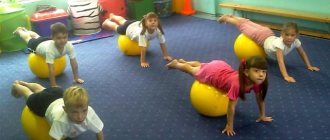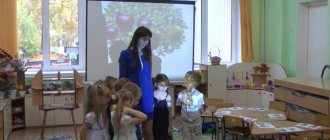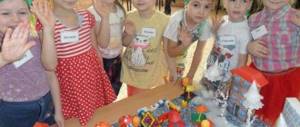Project “Game activities in the senior group of kindergarten”
Game activity project
“By playing we learn, by playing we learn!”
for older children
2018-2019 academic year
Completed by: teacher Manichkina E.V.
Relevance of the project:
“Childhood is the most important period of human life, not preparation for a future life, but a real, bright, original, unique life.
And how childhood passed, who led the child by the hand during childhood, what entered his mind and heart from the world around him - this decisively determines what kind of person today’s child will become,” - V. A. Sukhomlinsky. And since play is the leading activity of a preschooler , we, preschool employees and parents, must help the child make this activity (game)
: bright, positive, varied and educational.
The family plays a significant role in the development . How often do parents hear a familiar request from their children: “Mom, dad, play with me!”
And how much joy kids get when adults, overcoming fatigue and busyness, putting household chores aside, agree to play.
But many parents do not pay enough attention to the game, considering it not so important; due to employment; or simply not knowing how to organize a game with your baby. parents of the children will participate
in this project Take a close look at children, at how they spend their leisure time, and you will see how poor and limited the choice of games they use every day. How often children cannot find a use for their strengths, do not know what to do with themselves - they are not familiar with fun games and ventures.
No cartoons, films, computer games and much more can replace a real live game in a child’s life, in which he can actually, and not virtually, take part. the preschooler’s vocabulary, psychological background, and social experience , and this should not be allowed. In this regard, the topic of my project to be relevant today.
Play is a natural activity for a child. Role-playing game is the main type of game for preschool age. A role-playing game does not require a real tangible product from the child; everything in it is conditional, “everything is as if”, “for fun.” In the game, as in other types of activities, the leading role belongs to the teacher. It is complex and diverse. Forming an interest in role-playing games is a long and complex process, but if we want our children to form ideas about the adult world, relationships with peers, develop thinking, feelings, and will, it is simply necessary to do this. Play is of great importance for personal development.
Some work on guiding children’s play activities was carried out in the junior and middle groups, and by the beginning of the school year in the senior group, children already had a certain supply of gaming skills - they could independently prepare attributes for the game, distribute roles using counting rhymes, and learned collective communication skills. However, we noted the fact that when games arose that united a large number of children, disagreements were observed between them due to the distribution of roles, the nature of the plot development, and the method of specific execution of the game action.
Having summed up the work in the middle group and studied the Approximate basic general education program for preschool education “From birth to school.” edited by N. E. Veraksa, T. S. Komarova, M. A. Vasilyeva, methodological recommendations for the program, as well as technologies of N. Mikhailenko and N. Korotkova “Organization of plot-role-playing games in kindergartens,” we set before the following tasks:
- To develop children’s ability to independently choose a theme for the game.
- Develop the plot based on knowledge gained from the perception of the environment, from literary works, while watching TV programs.
- Learn to agree on a topic before the start of the game, assign roles, and prepare the necessary attributes.
- Develop the ability to combine various thematic plots into a single game plot.
- Learn collectively, build buildings necessary for the game, plan upcoming work together, and carry out your plans together.
The essence of the proposed approach according to Mikhailenko N. Ya., Korotkova N.A.
consists in the gradual transfer to children of increasingly complex gaming skills (methods of constructing a game) in the process of joint activity between an adult and children.
Objective of the project:
organizing children’s own activities in an atmosphere of mutual understanding. Own activity is the activity that the child wants to engage in and in which he: does, listens and hears, looks and speaks.
Conventionally, games can be divided into two main groups: role-playing (creative) games and games with rules.
Role-playing games are games on everyday themes, with industrial themes, construction games, games with natural materials, theatrical games, fun games, and entertainment.
Games with rules include didactic games (games with objects and toys, verbal didactic, board-printed, musical and didactic games) and outdoor games (plot-based, plotless, with sports elements).
Expected results of the project:
by the end of the year children can
- Agree with game partners to create a game plan; make suggestions for its improvement.
- Select and invent stories for the game; combine several separate plots into a common semantic line; make changes to the plot during the game.
- Change the content of the game depending on the number of children playing and the features of the plot.
- Use various sources to develop the plot of the game (excursions, movies, literature, impressions from the surrounding life).
- Make a choice of roles, emotionally live the accepted role; have several constantly played roles in the creative experience.
- Interacting with partners during the game, obey the rules, analyze the game process, adjust role-playing actions and game rules.
- Use unformed, multifunctional material and substitute objects in the game, creating a creative object-based play environment.
Project type
: creative.
Duration:
9 months (September – May), long-term.
Possible results (outputs) of project activities:
- catalog of didactic games for older groups,
- long-term plan,
- photo album or project presentation,
- three final events: Week of Games and Toys.
A week of winter games and fun
.
Sports week.
Long-term planning of play activities in the senior group
SEPTEMBER
1st week
1. Didactic game “Pyramids” Didactic task. Systematize objects by size in a given order, reflect this in speech. (12 rings).
2. Role-playing game with the teacher “Shop”. Target. Teach children to implement and develop the plot of the game. To develop knowledge about the functionality of the store, skills of cultural behavior in public places.
3. Game-experimentation with the sun. Target. Invite children to compare objects in the sun and in the shade, and reflect the results of observations in speech. Correct gaming relationships based on equal partnership.
2nd week
1. Didactic game “When we do it” Didactic task. To form an idea of the concept of “day”, of the sequence of parts of the day (using a visual aid).
2. Role-playing game with the teacher “Bus Driver” Goal. Develop the ability to divide into subgroups in accordance with the game plot, distribute roles and act according to the role assumed; learn to model role-playing dialogue.
3. Games-experiments with sand “Funny Cars” Goal. Continue learning how to make car figures using molds. Develop the ability to share toys with each other.
3rd week
1. Didactic game “Find the same pattern” Didactic task. Develop perseverance, observation, memory, geometric vigilance.
2. Role-playing game “Guests” Goal. Fostering cultural skills, imparting to children some knowledge of housekeeping (cleaning the room, setting the table).
3. Games-experiments with sand. Target. Consolidation. Continue learning about the properties of sand. Build a house using knowledge about the properties of wet and dry sand. Develop the ability to play together and find compromises.
4th week
1. Didactic game “What has changed.” Didactic task. Practice remembering the relative positions of geometric figures, develop the ability to think and reason.
2. Role-playing game “Beauty Salon”. Target. Teach children to prepare the necessary conditions for play, to be able to negotiate the distribution of roles.
3. Outdoor games “At the bear in the forest”, riding a scooter. Target. Develop dexterity and the ability to play outdoor games with words. Play as a team.
OCTOBER
1st week
1. Didactic game “It was - it will be.” Didactic task. Learn to establish the sequence of various events (yesterday, today, tomorrow, earlier - first, then - later).
2. Role-playing game “Family”. Encourage children to creatively reproduce family life in games. Improving the ability to independently create a game environment for a planned plot. Formation of valuable moral feelings (humanity, love, sympathy, etc.)
3. Ecological game “Which tree is the leaf from?” Target. Teach children to identify the type of tree by the appearance of the leaves and name them. Develop memory, attention, develop the ability not to interrupt comrades.
2nd week
1. Didactic game “Lay out the pattern.” Didactic task. Develop attention, spatial perception, relative position of figures. Develop mutual assistance skills.
2. Role-playing game “Kindergarten”. Target. To form children’s knowledge about the work of a teacher, nurse, laundress, cook and other kindergarten workers. Fostering interest and respect for their work. Developing in children a sense of gratitude for the work of adults for them, a desire to provide them with all possible help.
3. Finger play in pairs “Like our cat.” Target. Development of fine motor skills of the fingers, the ability to play in pairs.
3rd week
1. Didactic game “Who will see more? "Didactic task. Teach children consistent visual inspection and verbal description of the shape of objects.
2. Role-playing game “Firemen”. Target. To develop students’ knowledge about fire safety, the firefighter profession, and to cultivate respect for the work of people in this profession. Cultivate a desire to provide mutual assistance and a friendly attitude towards each other.
3. Game-experimentation “Drowning or not drowning.” Target. Development of cognitive interest, the ability to justify your answer.
4th week
1. Didactic game “Help the gnome learn the days of the week.” Didactic task. Introduce the children to the days of the week and their sequence. Learn to answer in order of priority, not to interrupt or shout down each other.
2. Role-playing game “Library”. Target. Learn to coordinate your own game plan with the plan of your peers. Display knowledge about the surrounding life in the game, show the social significance of libraries. Expand ideas about library workers, establish rules of conduct in a public place.
3. Outdoor games “Shooting at a target”, “Sunny rain”. Target. Develop interest in outdoor games, the ability to coordinate your actions with friends.
NOVEMBER
1st week
1. Didactic game “Collect beads.” Didactic task. Teach children to group shapes by shape, color and size. Ability to work in pairs.
2. Plot-based role-playing game “Theater” Goal.
Teach children to act in accordance with the role they have assumed, to form a friendly attitude among themselves. To consolidate children’s ideas about cultural institutions and their social significance.
3. Game with large building material “The House We Live In.” Target. Teach children to carry out spatial analysis of a building, build a house according to given rules, and develop communicative communication.
2nd week
1. Didactic game “Say further.” Didactic task. Continue to learn to establish the sequence of parts of the day, days of the week. Be able to listen and hear each other.
2. Plot-based role-playing game with the teacher “Hospital”. Target. Reveal the meaning of the activities of medical personnel. Formation of the ability to creatively develop the plot of the game. Fostering respect for the medical profession.
3. Finger game “Flower”. Target. Development of fine motor skills of fingers and hands. Develop children's communication skills.
3rd week
1. Didactic game “Freeze.” Didactic task. Teach children to understand a schematic representation of a person, to activate the process of attention. Continue to develop the ability to play in a team.
2. The plot is a role-playing game “Hospital”. Target. Strengthen the ability to take on a role and perform appropriate game actions, use medical instruments during the game and name them; promote the emergence of role-playing dialogue, form a sensitive, attentive attitude towards the sick person, and evoke sympathy for sick toys.
3. Games-experimentation with a magnet Purpose. Teach children to find metal objects using a magnet. Develop observation, attention, and the ability to play together.
4th week
Week of games and toys.
DECEMBER
1st week
1. Didactic game “Find a toy.” Didactic task. Teach children how to navigate the playroom according to plan. Continue to develop the children’s ability to play together and help each other.
2. The plot is a role-playing game “Zoo”. Target. Enrich and concretize children's knowledge and ideas about wild animals and their habits and conditions of captivity. Foster respect for the work of zoo workers. Instill love for animals, cultivate a sense of kindness and pity.
3. Finger game in pairs “Family”. Target. Development of fine motor skills of the fingers, communicative communication.
2nd week
1. Didactic game “Where is whose house?” Didactic task. Develop observation skills. Reinforce the concepts of “higher - lower”, “more - less”, “longer - shorter”. Develop the ability to act in concert, according to certain rules.
2. Plot-role-playing game with the teacher “Road Traffic”. Target. Enrich and concretize children's knowledge about traffic rules. Cultivate respect for the work of the driver and police officer. Teach polite manners in the process of communication “driver - passenger”, “driver - policeman”.
3. Board games dominoes “Fruits”, lotto “Animal World”. Target. Develop attention, memory, interest in board games and the ability to play together.
3rd week
1. Didactic game in pairs “Zoological Dominoes”. Didactic task. Strengthen children's knowledge about wild and domestic animals. To cultivate intelligence, attention, perseverance, and the ability to play in pairs.
2. The plot is a role-playing game “Journey to the Future”. Target. Learn to follow the rules of behavior in the game. Cultivate goodwill between children, the ability to take into account the wishes of peers. Encourage children to creatively use acquired knowledge and develop initiative.
3. Ecological Lotto game “Who Lives Where” Goal. Consolidating children's knowledge about animal habitats. Develop communication.
4th week
1. Didactic game “Find a toy.” Didactic task. Strengthen children's ability to navigate the playroom according to plan. Continue to develop the children’s ability to play in a team.
2. Plot-role-playing game “Theater”. Target. To form children's ideas about the theater. Continue to develop the ability to expressively convey the images of fairy tale characters in speech, and coordinate your actions with other “artists.”
3. Outdoor game “Geese - swans”. Target. To develop children's self-control and ability to perform movements when given a signal. Practice running while dodging.
JANUARY
1st week
1. Didactic game “Who knows more how to use the object.” Didactic purpose. Develop children's memory, enrich their knowledge about subjects; cultivate resourcefulness, quick wits, and the ability to listen to a friend without interrupting.
2. Plot-based role-playing game “Come get a haircut with us.” Target. Strengthen children's ability to act out a familiar plot, induce a positive emotional state from playing with peers.
3. Board game "Mosaic". Target. Continue to develop fine motor skills. Develop imagination, imagination, sense of color, perseverance, and the ability to evaluate and praise a friend’s work.
2nd week
1. Didactic game “Who knows more how to use the object.” Didactic purpose. To consolidate children's knowledge about the use of objects, to continue to develop the skills of playing harmoniously and according to the rules. Develop memory.
2. Plot-based role-playing game “Mail”. Target. Learn to build a game plan, determine ways to implement the plan, and play for a long time. Learn to distribute roles without conflict, obey the rules, and increase the number of players.
3. Games with construction sets and building materials “Building a house.” Target. Development of constructive abilities. Form friendly relationships in the game, a sense of humanity, responsibility, friendliness.
3rd week
1. Didactic game “Find similar objects.” Didactic task. Teach children to compare objects, distinguish them by material; look for signs of similarity in color, shape, size. Develop the ability to play in subgroups and empathize with comrades.
2. The plot is a role-playing game “Builders”. Target. Teach children to independently unite 5-6 people in a game according to their likings. Encourage different playing groups to achieve independent resolution of conflicts in the game among themselves.
3.
Game - experiment “Ice - solid water”. Target. Introduce children to the property of water to turn into ice. Learn to give the correct description when describing the properties of ice. Show the dependence of the state of water on temperature. Develop the ability to communicate and listen to each other.
4th week
1. Didactic game “Find similar objects.” Didactic task. Strengthen children’s ability to compare objects and distinguish them by material; look for signs of similarity in color, shape, size. Develop attention, observation, communication skills.
2. The plot is a role-playing game “Atelier”. Target. Learn to build a game plan, determine ways to implement the plan, and play for a long time. Independently select attributes and substitutes, encourage the use of imaginary objects.
3. Outdoor games “Throw on a ring.” Target. To develop children's attention, eye, and coordination of movements. Practice throwing and the ability to take turns.
FEBRUARY
1st week
1. Didactic game “Find your match.” Didactic task. Continue to teach how to select colors according to a pattern, act on a color signal, develop attention, friendliness, and the ability to play in a team.
2. Plot - role-playing game with the teacher “Railroad”. Target. To deepen, expand and concretize children’s knowledge about the work of railway workers and about the railway. To foster respect for the work of railway workers.
3.Environmental Lotto games “Animal World”, “Who is Missing”. Target. Consolidating children's knowledge about animals. Develop observation, attention, communication.
2nd week
1. Didactic game “Find your place.” Didactic task. Strengthen the ability to select a color based on a sample and act on a color signal. Form friendly relationships in the game.
2. The plot-role-playing game “Railroad”. Target. To consolidate children's knowledge about the work of railway workers, about the railway. Continue to instill respect for work.
3. Outdoor game “Cat and Mice”. Target. To develop children's attention and dexterity. Practice walking in circles, running, catching. Encourage independent distribution of roles and obey established rules.
3rd week
1. Didactic game “Seasons”. Didactic task. Form the idea that each season has its own defining color: winter has white, autumn has yellow, spring has green, summer has variegated. Develop attention and interest in the results of actions.
2. Role-playing game with the teacher “Border Guards”. Target. Introduce children to the important role the Army plays. Introduce ranks. Foster a sense of patriotism and pride in the Army. Give an idea of the types of troops.
3. Printed board game “My House”. Target. Developing interest in board games. Help create a playful environment and establish interaction between children.
4th week
Sports week involves various types of activities with children, forms ideas about a healthy lifestyle, and a sustainable interest in physical exercise.
Week of winter games and fun
Goal of the week: develop motor activity, agility, speed, strength, general endurance; develop attention in children; bring joy to children; promote the formation of a caring attitude towards children; continue work to strengthen the interaction between kindergarten and family in the development of the child.
| In a week | Memorizing poems about winter; reading works of fiction: fairy tales; writing stories about winter, winter fun, and winter sports. Conversation about the Olympic Games. Looking at illustrations about winter sports. organization of outdoor and winter games; looking at illustrations about winter and winter sports. Various competitions: “Best snow building”, “Best pattern of colored ice floes”, creative work competition “Winter Fun” (drawings and applique) |
MARCH
1st week
1. Didactic game “Whose clothes are they wearing?” Didactic task. Clarify children's knowledge about work clothes, teach them to distinguish people of different professions. Develop memory, attention, perseverance.
2. The plot-role-playing game “Polyclinic”. Target. Consolidating knowledge about the activities of medical personnel. Continue to develop the ability to creatively develop the plot of the game. Foster respect for the medical profession.
3. Outdoor game “Make a figure” Goal. To develop balance in children and the ability to play in a team. Practice running and jumping.
2nd week
1. Didactic game “Who needs what.” Didactic task. Strengthen children's knowledge about different professions. Exercise in the classification of objects, the ability to name objects necessary for people of a certain profession. Develop the ability to communicate with each other.
2. The plot is a role-playing game “Construction”. Target. Continue to teach children to assign roles and act in accordance with the assumed role, use attributes in accordance with the plot, construction sets, building materials, resolve disputes fairly, act in accordance with the game plan.
3. Board game “Mosaic” Goal. Develop fine motor skills of the hands. Encourage creative joint activity of children in the game.
3rd week
1. Didactic game “Birds, animals, fish.” Didactic task. Teach children to classify birds, animals, and fish according to their characteristic features. Develop the ability to work in teams.
2. The plot is a role-playing game “Barbershop”. Target. Revealing the meaning of a hairdresser's activity. Formation of the ability to creatively develop the plot of the game. Fostering respect for the hairdressing profession.
3. Finger game in pairs “Wash the bunny’s eyes.” Target. Development of fine motor skills of the fingers. Developing children's ability to play in pairs; establish interaction between children who have chosen certain roles.
4th week
1. Didactic game “Hide and find.” Didactic task. Continue to learn how to navigate the space of a room, consistently inspect it; develop attention and memory; learn to identify objects in the field of view from the surrounding environment.
2. Plot-role-playing game “We are playing theater.” Target. Strengthen children’s skills to act in accordance with the role they have assumed, and form a friendly attitude among themselves. Cultivate a love of theater.
3. Outdoor game "Blind Man's Bluff". Target. Teach children coordination of movements and the ability to navigate in space. Develop a desire to play as a whole group, following the rules of the game.
APRIL
1st week
1. Didactic game “Nature and Man”. Didactic task. To consolidate and systematize children’s knowledge about what is created by man and what nature gives to man. Create a sense of responsibility and friendliness.
2. The plot is a role-playing game “Rescuers and security guards”. Target. Give a clear idea that we must not forget about life safety in any conditions. Learn to quickly make the right decisions in extreme situations. Cultivate a sense of responsibility towards comrades.
3. Game - experiment “Funny Boats”. Target. Teach children to observe spring changes in nature, come up with game options, and show creativity. Develop the ability to play in a team.
2nd week
1. Didactic game “It happens or not.” Didactic task. Develop logical thinking, be able to notice inconsistencies in judgments and prove your point of view. Cultivate a sense of tact and the ability to listen to a friend.
2. The plot is a role-playing game “Shop”. Target. To consolidate children's learning to implement and develop the plot of the game. Continue to develop knowledge about the functionality of the store. Strengthen the skills of cultural behavior in a public place.
3. Finger game in pairs “Merry Family”. Target. Development of fine motor skills of fingers and hands, communication abilities of children.
3rd week
1. Didactic game “What grows where.” Didactic task. Teach children to group plants according to where they grow. Develop activity and independent thinking.
2. Plot-based role-playing game “Bus Driver” Goal. Strengthen the ability of children to be divided into subgroups in accordance with the game plot, to assign roles and act according to the role they have assumed; continue to teach how to model role-playing dialogue.
3 Outdoor games “Football”, riding a scooter. Target. Develop dexterity and the ability to play outdoor games with a ball. Continue to teach the children to play team games.
4th week
1. Didactic game “What grows where.” Didactic task. To consolidate children's knowledge about plants, to develop the ability to establish spatial connections between objects. Help create a playful environment and establish interaction between children.
2. The plot-role-playing game “Mail – Journey”. Target. To consolidate children's knowledge about the work of postal workers. Come up with new storylines in a game about mail. Continue to teach children to use various forms of communication - mail, telephone, telegraph, radio. Foster a culture of communication in children.
3.Game - experiment “Transfer of a sunbeam”. Target. Tell the children about the properties of sunlight. Learn to play with sunbeams. Develop dexterity and the ability to derive joy from communicating with peers.
MAY
1st week
1. Didactic game “Our city Moscow”. Didactic task. Clarify children's knowledge about the capital of our Motherland - Moscow. To cultivate love for the main city of our country, a desire to learn more about its attractions.
2. Plot-based role-playing game “Transport”. Target. To form in children an idea of the enormous importance of transport. Repeat its types: ground, underground, air. Foster respect for the work of workers involved in transport. Continue to teach how to distribute roles and play in subgroups.
3. Outdoor game “Whose team will get together sooner?” Target. Teach children to play outdoor games with elements of competition, to fairly evaluate their results and the results of their comrades.
2nd week
1. Didactic game “Our city Moscow”. Didactic task. Consolidating knowledge about your hometown. Continue to cultivate love for the capital, develop a desire to know more about Moscow, and friendliness.
2. The plot is a role-playing game “Family”. Target. Strengthen children's understanding of the purpose of family. Continue to develop ways of maintaining family ties, showing care, love, and respect for each other. Deepening ideas about family relationships (brother, sister, aunt, uncle).
3.Board game “Loto colored figures”. Target. Reinforce the concepts of “shape” and “color”. Develop attention, the ability to compare, accurately identify and select, as well as coordination of hand movements. Strengthen the ability to divide into subgroups and fairly evaluate results.
3rd week
1. Didactic game “Guess it.” Didactic task. Teach children to describe an object without looking at it, to identify essential features, and to recognize an object by description. Continue to form friendships in the game.
2. Plot-based role-playing game “Ambulance”. Target. Continue to foster respect for the work of medical workers. Expand and generalize knowledge about people in this profession. Cultivate attention and sensitivity to each other. Showing attention to the patient.
3.Winnie the Pooh board game. Target. Continue to teach children to play several people in one game, while observing the order and rules of the game. Develop attention, perseverance, empathy.
4th week
FINAL EVENT FOR THE 3rd QUARTER OF THE SCHOOL YEAR
Sports week
“Organization of play activities for young children in accordance with the Federal State Educational Standard”
Slide 1
Slide 2
Play is of great importance for the social and personal development of a child. The game has long been used for education and training. Folk pedagogy skillfully applied it for different ages. In some games, the tasks of mental education came to the fore, in others - physical, and thirdly - artistic.
Play is a child’s vital need and a means of all-round development. In play, children become active, rejoice, and laugh. Communicating with children, the child learns to play together, give in, help a friend, and share toys. As a result of the game, endurance is developed. Play is the most important part of a child’s life and one must approach play very carefully.
Slide 3
In modern pedagogy, the following types of games are distinguished.
Slide 4
The modern generation even prefers individual computer games to collective yard games. However, this preference is largely formed by adults who are always in a hurry: mothers and fathers who work a lot simply don’t have time, grandparents live separately from their grandchildren and also work, and teachers work hard to prepare children for school. This trend is typical not only for our country, but also for the whole world. Scientists and educators from all countries talk about the need to return children's right to play. The right to play is enshrined in the Convention on the Rights of the Child (Article 31). However, this right is violated much more often than other rights of the child. Reasons for violations: 1) lack of understanding by adults of the importance of the game; 2) lack of a safe space for play; 3) inadequate policy of officials; 4) lack of an appropriate subject environment that supports the game: 5) the pressure of educational tasks and the priority of educational actions; 6) complete absence of play at school; 7) strict programming of children’s free time; technologization and commercialization of children's games. The main reason is that the right to play is declaratively recognized, but not ensured by teachers, parents, and officials. The attitude towards the game should change positively with the introduction of the Federal State Educational Standard for Education on January 1, 2014. As the main principle of preschool education, the standard puts forward “the child’s full experience of all stages of childhood (infancy, early and preschool age), the enrichment (amplification) of child development.” In addition, the text of the standard states that the implementation of the Program should be carried out “in forms specific to children of a given age group, primarily in the form of play...”. Today, a new system of preschool education is being established in society. The fundamental documents of the regulatory legal framework of the preschool education system, mandatory for execution in all types and kinds of educational organizations, the guideline for the development of the preschool education system are the following regulatory documents.
However, this preference is largely formed by adults who are always in a hurry: mothers and fathers who work a lot simply don’t have time, grandparents live separately from their grandchildren and also work, and teachers work hard to prepare children for school. This trend is typical not only for our country, but also for the whole world. Scientists and educators from all countries talk about the need to return children's right to play. The right to play is enshrined in the Convention on the Rights of the Child (Article 31). However, this right is violated much more often than other rights of the child. Reasons for violations: 1) lack of understanding by adults of the importance of the game; 2) lack of a safe space for play; 3) inadequate policy of officials; 4) lack of an appropriate subject environment that supports the game: 5) the pressure of educational tasks and the priority of educational actions; 6) complete absence of play at school; 7) strict programming of children’s free time; technologization and commercialization of children's games. The main reason is that the right to play is declaratively recognized, but not ensured by teachers, parents, and officials. The attitude towards the game should change positively with the introduction of the Federal State Educational Standard for Education on January 1, 2014. As the main principle of preschool education, the standard puts forward “the child’s full experience of all stages of childhood (infancy, early and preschool age), the enrichment (amplification) of child development.” In addition, the text of the standard states that the implementation of the Program should be carried out “in forms specific to children of a given age group, primarily in the form of play...”. Today, a new system of preschool education is being established in society. The fundamental documents of the regulatory legal framework of the preschool education system, mandatory for execution in all types and kinds of educational organizations, the guideline for the development of the preschool education system are the following regulatory documents.







